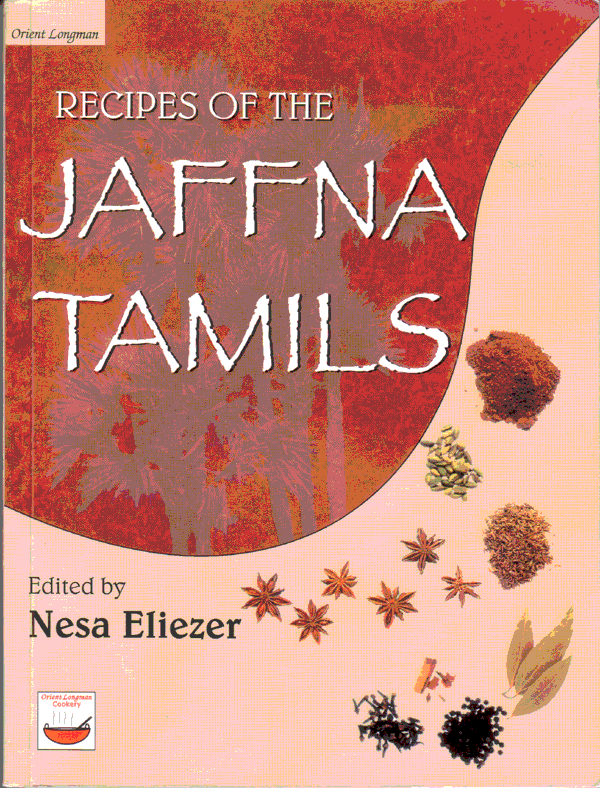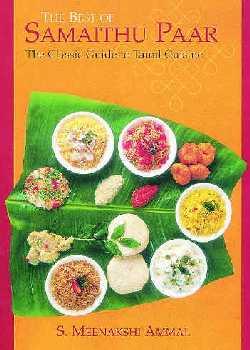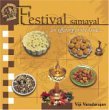Samaippathu Yeppadi?
சமைப்பது எப்படி?
 தென்னிந்திய
உணவுப் பழக்கங்களை மையமாகக் கொண்டு எழுதப்பட்டது. ஸ்குவாஷ், ஜெல்லி, பான
வகைகளின் செய்முறை, அழகுக் குறிப்புகள், மற்றும் பல பயன் தரும் குறிப்புகளுடன்
கூடியது.
தென்னிந்திய
உணவுப் பழக்கங்களை மையமாகக் கொண்டு எழுதப்பட்டது. ஸ்குவாஷ், ஜெல்லி, பான
வகைகளின் செய்முறை, அழகுக் குறிப்புகள், மற்றும் பல பயன் தரும் குறிப்புகளுடன்
கூடியது.
 How
To Cook? [Vegetarian] Recipes of Typical South Indian delicacies
How
To Cook? [Vegetarian] Recipes of Typical South Indian delicacies
 *
Nesa Eliezer (editor) Rani Thangarajah (Compiler) -
Recipes of the Jaffna Tamils
*
Nesa Eliezer (editor) Rani Thangarajah (Compiler) -
Recipes of the Jaffna Tamils
"...The Tamils of the north and east of Sri Lanka have
a distinct cuisine which reflects their geography and their resourcefulness
in the use of the products of their harsh lands. This compilation of
recipes of the Jaffna Tamils is a tribute to that tradition. Rani
Thangarajah collected these from her own family recipes and from Tamil women
who maintain the spirit of Tamil cooking wherever they go. Grandmothers,
mothers and aunts are always silently remembered in collections such as this
one. The recipes were collected in Tamil. They have been translated and
edited by Nesa Eliezer.
Encouraged by a first hand knowledge of these recipes from
her Tamil heritage in Malaysia, and a keen interest in the cultural
traditions of the Indian sub-continent, especially of the Tamils, Nesa
Eliezer has brought to this collection an understanding of the need to
record and remember these precious recipes for the women of the Tamil
diaspora. Nesa Eliezer is a freelance writer and contributes to a wide
variety of magazines. She has completed two other books, one a children's
book A Tale of Two Journeys on the geographical journey of the Buddha, and
the other The Clever Woman's Companion, a compilation of household wisdom.
Rani Thangarajah is a Tamil poet and has been actively involved in cultural
productions from a young age. She contributes poems and articles to a number
of Tamil publications. Both of them live in Melbourne, Australia. All
proceeds from the sale of this book go towards supporting Women's projects
in Tamil Eelam."
*Madhur Jaffrey -
An Invitation to Indian Cooking Paperback
*Madhur Jaffrey -
Madhur Jaffrey's Indian Cooking Paperback
*Madhur Jaffrey -
Madhur Jaffrey's Quick & Easy Indian Cookery Paperback;
*Madhur Jaffrey, Philip
Salaverry -
Madhur Jaffrey's Quick and Easy Indian Cooking Paperback
*Madhur Jaffrey -
Madhur Jaffrey's Spice Kitchen : Fifty Recipes Introducing Indian Spices and
Aromatic Seeds
Hardcover
* Mary Anne Mohanraj -
A Taste of Serendib: A Sri Lankan Cookbook
*Kingman, Rani -
A Taste of Madras : A South Indian Cookbook Paperback,
Published 1997(**alternative
link to Amazon.co.uk)
 "From
the Preface - "As a young girl growing up in Madras I learned many
customs regarding food as I watched my mother at work in her kitchen.
Later, I learned to cook as my grandmother, my mother and my aunts all
showed me their recipes and their techniques. Now I have written down
the recipes passed down to me, so that my sons - who have grown up with
the richness of two cultures - and others may learn the traditions of
Madras. For Tamilians, food is closely connected with many customs and
beliefs, all of which formed an inherent part of my upbringing. So
alongside my recipes I have tried to convey a little of the philosophy
that underlies this cuisine, as well as the day-to-day practices
associated with foods and cooking.. The kitchen in a Tamilian home,
where the preparation and cooking begins, is considered pure and sacred.
The cook, who has to wash thoroughly before she starts preparing the
meals and may not be touched while cooking, is not permitted to taste
any of the food during the course of preparation because it may become
polluted. So Tamilian cooks learn to measure by sight, and to gauge the
flavor from the cooking aromas. Consequently, in writing down my
recipes, it has not always been easy to give precise quantities for this
ingredient or that, nor precise cooking times - however, all the recipes
have been carefully recorded and tested, and they taste just as they
should. I hope you enjoy learning about these beliefs and customs from
Madras, which I am proud of, and that the taste of Madras gives your
kitchen a Tamilian warmth and hospitality. 'The first virtue in any
creed is to share your food and cherish all life.' Thirukkural "
"From
the Preface - "As a young girl growing up in Madras I learned many
customs regarding food as I watched my mother at work in her kitchen.
Later, I learned to cook as my grandmother, my mother and my aunts all
showed me their recipes and their techniques. Now I have written down
the recipes passed down to me, so that my sons - who have grown up with
the richness of two cultures - and others may learn the traditions of
Madras. For Tamilians, food is closely connected with many customs and
beliefs, all of which formed an inherent part of my upbringing. So
alongside my recipes I have tried to convey a little of the philosophy
that underlies this cuisine, as well as the day-to-day practices
associated with foods and cooking.. The kitchen in a Tamilian home,
where the preparation and cooking begins, is considered pure and sacred.
The cook, who has to wash thoroughly before she starts preparing the
meals and may not be touched while cooking, is not permitted to taste
any of the food during the course of preparation because it may become
polluted. So Tamilian cooks learn to measure by sight, and to gauge the
flavor from the cooking aromas. Consequently, in writing down my
recipes, it has not always been easy to give precise quantities for this
ingredient or that, nor precise cooking times - however, all the recipes
have been carefully recorded and tested, and they taste just as they
should. I hope you enjoy learning about these beliefs and customs from
Madras, which I am proud of, and that the taste of Madras gives your
kitchen a Tamilian warmth and hospitality. 'The first virtue in any
creed is to share your food and cherish all life.' Thirukkural "
*Singhan, E.V -
Tamil Recipes
The
Best of Samaithu Paar : The Classic Guide to Tamil Cuisine - S.
Meenakshi Ammal. 1906-1962) was born in Kottur, Tamilnadu. "Married at
eighteen, she was widowed early into her marriage. She moved to Madras in
1945 with her son. Very well versed in culinary skills, she was constantly
besieged with requests for recipes by her relatives, which prompted her to
write a cookery book. Her books have been in print since then and have been
translated into many Indian languages."
 "The
first volume of Samaithu Paar was published in 1951. More than just a
cookery book, it was intended to serve as a manual for daily use. Over
the years, those who did not find time to learn cooking in the
traditional way from their mothers have used the three volumes of
Samaithu Paar to set up home and manage kitchens all over the world."The
Best of Samaithu Paar" brings together 100 most-loved recipes chosen
from the three-volume original. Maintaining the simplicity of language,
easy-to-follow directions and the adherence to the smallest details, the
recipes have been suitably revised and adapted using universal measures
of cups and spoons and modern utensils and appliances in place of the
more traditional ones."Recipes range from the basic idli, dosai, sambar
and rasam to their many variations that are not so familiar to all
Indians. The book also includes specialists like Moar Kuzhambu, Mysore
Rasam, Pongal, Murukku and Jangiri, as well as pachadis and pickles.
"The
first volume of Samaithu Paar was published in 1951. More than just a
cookery book, it was intended to serve as a manual for daily use. Over
the years, those who did not find time to learn cooking in the
traditional way from their mothers have used the three volumes of
Samaithu Paar to set up home and manage kitchens all over the world."The
Best of Samaithu Paar" brings together 100 most-loved recipes chosen
from the three-volume original. Maintaining the simplicity of language,
easy-to-follow directions and the adherence to the smallest details, the
recipes have been suitably revised and adapted using universal measures
of cups and spoons and modern utensils and appliances in place of the
more traditional ones."Recipes range from the basic idli, dosai, sambar
and rasam to their many variations that are not so familiar to all
Indians. The book also includes specialists like Moar Kuzhambu, Mysore
Rasam, Pongal, Murukku and Jangiri, as well as pachadis and pickles.
Recipe of a classic "For generations of brides, this unpretentious
book was an invaluable storehouse of information on vegetarian cooking
...When women of my generation got married. We were given Samaithu Paar
as one of the wedding gifts. If not, we got it ourselves, treating it as
a bible for cooking delicious South Indian food. That it was not
available in any of the well-known bookshops made it more precious and I
remember, how, after a long search, I purchased my copy at a relatively
small shop in Mylapore. It seemed incredible that Meenakshi Ammal, a
simple housewife from a traditional Tamil family, untrained in the
intricacies of logical writing and publishing, should venture to
document all that the she knew in cooking with such meticulous detail.
She was encouraged by her uncle K. V. Krishnaswamy Iyer "a leading
advocate and ex-president of the Music Academy..."
more
*Camellia Panjabi -
The Great Curries of India
*Julie Shani -
Classic Indian Cooking;
*Julie Shani -
Classic Indian Vegetarian and Grain Cooking
*Julie Shani -
Moghul Microwave : Cooking Indian Food the Modern Way
*Julie Shani -
Savoring Spices and Herbs : Recipe Secrets of Flavor, Aroma, and Color
* Viji Varadarajan -
Samayal: The Pleasures of South Indian Vegetarian Cooking
This book is all about the "Pleasures of South Indian
Vegetarian Cooking" and serving a loving meal. "Samayal" in Tamil means
cooking and in Indian cuisine, one can find distinct flavour and styles
of cooking. The author is a housewife who has a passion for cuisine,
dance and learning languages.
* Viji Varadarajan -
Festival Samayal
 The
book deals in detail on the festival recipes of the southern Indian
state of Tamilnadu. Most festivals have specific dishes associated with
them - either because they are favorites of the God being prayed to - or
because their ingredients are specific to the season or reflect the
spirit behind the celebration. It is these special dishes prepared
at home on a festival day that are first offered to God after doing the
required pooja (prayers offered to the God by a priest or a family
member) Festivals in India are joyous affairs when families and friends
come together for a merry feast after an offering is made to the deity.
The
book deals in detail on the festival recipes of the southern Indian
state of Tamilnadu. Most festivals have specific dishes associated with
them - either because they are favorites of the God being prayed to - or
because their ingredients are specific to the season or reflect the
spirit behind the celebration. It is these special dishes prepared
at home on a festival day that are first offered to God after doing the
required pooja (prayers offered to the God by a priest or a family
member) Festivals in India are joyous affairs when families and friends
come together for a merry feast after an offering is made to the deity.
Special emphasis is also given to the art of kolam � a religious hindu
floor art, drawn by the women of the house, early in the morning after
their bath. In the Indian culture guest occupy a very special place and
a kolam drawn at the entrance of the house, expresses the warmth felt
towards visitors. This decorative art word with a delicate touch and a
highly artistiv sense of colour, tone, and blending is drawn in front of
the deities in pooja rooms as well. Being an offering to the Gods, the
kolams in the pooja rooms are never swept with a broom, but instead are
either wiped away with a cloth or gathered up by hand and then disposed
off. Rice flour and fresh flowers are the materials used for painting on
the floor.
In essence this book is The Culinary Offerings To The Gods � known as
prasadham or neiveidhiyam. There are a wide variety of dishes produced
by different communities of the state. Tamil cuisine is healthy and
flavorful with some of its most common ingredients being turmeric, dried
red chillies, mustard, fenugreek, and tamarind. It is one of the very
few states that uses all parts of the banana tree on a daily basis � the
stem, flower, raw and ripe fruit to cook with, and the leaf to serve
things on and wrap things with. Sesame oil forms the base for most Tamil
Brahmin cooking